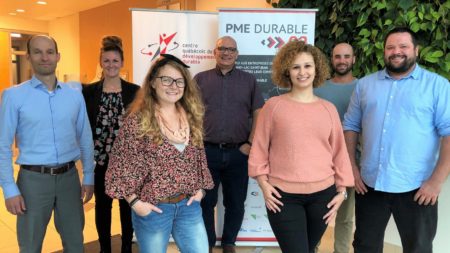Rio Tinto Renews Partnership with the Centre Québécois de Développement Durable

Members of the Centre québécois de développement durable (CQDD) team working on the PME Durable initiative: Nicolas Gagnon, Julie Perron, Catherine Dufour-Rannou, Jean Martel, Zaineb Oubaita, Carl Bernatchez, and Simon-Pierre Tremblay.
Rio Tinto has supported the PME Durable 02 initiative since its inception in 2015, with a total contribution of $280,000 from the Rio Tinto Aluminium Canada Fund. As the initiative, coordinated by the Centre québécois de développement durable (CQDD), enters its third phase, Rio Tinto is proud to announce that it will make a financial contribution of $90,000 and continue to partner with the CQDD for the next three years (2021-2023). With a shared vision of the future, Rio Tinto and the CQDD are joining forces to transform the entrepreneurial ecosystem by promoting more environmentally responsible business practices for a sustainable future.
“Rio Tinto is proud to be actively involved with small and medium enterprises [SMEs] to support our region’s sustainable development and pave the way for a greener and more responsible circular economy,” said Catherine Munger, General Manager, Environment and Sustainability, Rio Tinto Aluminium. “This collaboration is part of Rio Tinto’s commitment to continually improve its practices, which includes contributing to sustainable development to protect the environment and support our communities.”
Rio Tinto’s contribution will have a direct impact on the practices of hundreds of businesses in the region. It will facilitate the creation of cohorts of 15 companies per year that will participate in the training-coaching programme to launch corporate sustainable development processes, provide 30 companies per year with digital support to perform self-diagnoses, and generate sustainable development action plans. In addition, 12 information sessions on sustainable development practices will be organised for 200 businesses.
An enhanced third phase
In consultation with regional partners, the third phase of the initiative has been enhanced to increase the impact on local economic development businesses and organisations.
“With this phase we are now moving into third gear by providing digital support through l’Activateur, a brand-new web application that will be available free of charge to businesses in the region,” said Nicolas Gagnon, General Manager at CQDD, and manager of the initiative. “L’Activateur will launch on 21 April and will help businesses conduct a sustainable development self-diagnosis according to their field of activity so as to then create an action plan. The training-coaching programme has also been revised to better equip businesses to deal with the current challenges of attracting and retaining workers.”
Several other activities are also planned for the region’s economic development organisations, including conferences, training sessions, and guidance with incorporating sustainable development into their management and planning tools as well as into their support services for the start-up and growth of SMEs in Saguenay–Lac-St-Jean.
“The initiative’s original goal was to make sustainable development a hallmark of the Saguenay–Lac-St-Jean region,” Gagnon added. “When people think about our region, they think of blueberries, aluminium, forests, and now sustainable development, as features of our business culture. We want to keep going in this direction, and all of these companies actively participating in the initiative reflects the change that is taking place. The entrepreneurial ecosystem, which includes business advisors—companies’ front-line players—needs to be properly equipped. We have clearly understood that this is key to speeding up the local economy’s sustainable transition.”
Pioneering environmentally responsible practices
Rio Tinto’s business strategies are based on preserving the environment and supporting the communities in which it operates. For several decades, specific actions have been taken to produce aluminium with a reduced carbon footprint. Rio Tinto’s carbon footprint is among the lowest on the planet, generating seven to eight times less CO2 emissions than those generated in other parts of the world.
Rio Tinto is committed to further improving its practices and continues to set ambitious targets, including reducing its emissions 50% by 2030 and being net zero by 2050.
Further significant improvements will be made across the aluminium supply chain, including the development of ELYSIS, an inert anode smelting technology that will eliminate 100% of GHG emissions from the smelting process.
In addition to continuing to improve its practices, Rio Tinto actively supports the region’s SMEs in their efforts to become more sustainable, in particular by backing forward-looking projects such as PME Durable 02.


